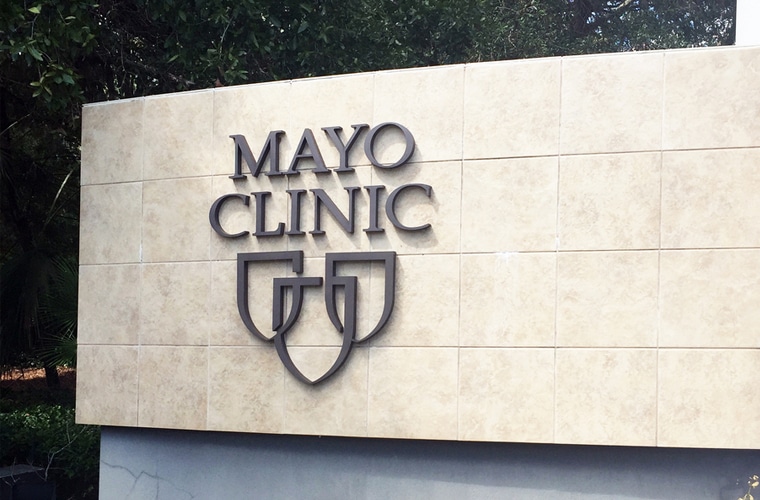So far, the early months of summer have detoured me three times to the Mayo Clinic in Rochester, Minnesota.
Although I’ve had nine surgeries at Mayo since 1975, my three drives from west Michigan to southeast Minnesota have not been about me. My youngest brother had heart-transplant surgery on Memorial Day, and today is his 71st consecutive day in a Mayo hospital.

In late April, during two days of scheduled appointments, Mayo doctors admitted him to the hospital. In his third week of hospitalization, he was added to the heart-transplant list as a priority status 2 (on a 6-point scale). This was good news on one hand because it meant he was likely be matched with a new heart in a relatively short time; on the other, it indicated how compromised his own heart was.
Three weeks later, a heart became available, and a 10-hour transplant surgery began on Memorial Day evening. A month in the hospital following a heart transplant is standard, but he’s had a rocky recovery and still is probably a month away from discharge.
It’s been an emotional roller-coaster for my brother and sister-in-law.
Being present with them in Rochester, and posting updates to keep family and friends informed, have been tangible ways to offer support. Yet, the routine of spending day after day in a cardiac ICU room crammed with monitors and pumps, trying to steer clear of the parade of nurses, specialists, and other staff who enter his room to do their thing—it’s a mind-numbing, mind-blowing amount of care focused on one person whose life hangs in the balance.
My brother is 61 and has been seeing heart specialists for nearly 20 years. After numerous procedures and treatments, he and his wife chose to sell their small family farm eight years ago because physically he couldn’t keep up with the work. He was hired by a nearby farm supply co-op and held a range of responsibilities. When his ability to work became severely compromised last year, he went on six months of short-term disability; eventually, his employment was terminated.
His health insurance through his now-former employer officially just ended, on June 30.
A year ago, he considered a heart transplant to be a last resort. This spring, he came to the realization that he had no choice—it represented his only chance of living and regaining some quality of life.

According to the 2025 Milliman Research Report, the estimated cost of a heart transplant in the United States before insurance is about $2 million. Financial assistance for heart patients who receive a transplant can be challenging to navigate. Medical insurance does not provide 100 percent coverage for heart transplants or post-transplant care in most cases. My brother and sister-in-law were not anticipating or prepared for this journey.
During my time in Rochester, I’ve been one of the people helping to navigate their health coverage options. So far, my brother has qualified for Social Security Disability Insurance and early Medicare, but he’s been denied other potential benefits. Their out-of-pocket costs are unknown at this point.
For some, it prompts the question: What is the actual value of a human life? Assigning a dollar value to one person’s life is impossible, not to mention cruel. Even if, as Iowa Senator Joni Ernst reminds us, “We’re all going to die,” how do we decide when to stop living, or stop trying to live, or stop providing life-sustaining treatment to a loved one on life support?
Even for those who feel pressured or obligated to “earn” what they receive, how do we earn the right to receive another person’s organ, or stem cells, to have a chance of extending our own life?
When my brother learned that a new heart was available, there was a collective sigh of relief, but also a heavy, wrenching sense of gratitude toward an anonymous family that we knew was in shock and grief and yet allowed their loved one’s organs to be procured. Although we know nothing about the donor or the family, I see their decision as a clear demonstration of mercy and a recognition that in untold ways we belong to each other.
“Blessed are the merciful, for they will be shown mercy,” Jesus said. Mercy is God’s tenderheartedness, pity, and kindness toward those who are suffering or in distress. Outside of a worship service, however, I seldom say or hear the word mercy. Public demonstrations are sadly in short supply.

The looming specter of the “One Big Beautiful Bill” has been center stage throughout my brother’s hospitalization. To meet President Trump’s Fourth of July deadline for passage, Republicans have been moving the bill through Congress using special rules that deprive Democrats of the ability to block it. GOP leaders have been struggling to rally support for Medicaid changes that would leave millions without coverage. Republicans are relying on the Medicaid provider tax change along with other healthcare restrictions to save hundreds of billions of dollars to offset the cost of trillions of dollars in tax cuts.
More than all its shortcomings, I find this legislation heartless and cruel. The overwhelming percentage of Republicans in Congress supporting the bill identify as Christians (98 percent), but what is their understanding of and commitment to mercy?
In a 2011 interview with Krista Tippett, Walter Brueggemann said about mercy:
Mercy is the capacity to give oneself away for the sake of the neighborhood. Now, none of us does that completely. But it makes a difference if the quality of social transactions has to do with the willingness to give oneself away for the sake of the other, rather than the need to always be drawing all the resources to myself for my own well-being. [Mercy] is this kind of generous connectedness to others. Our task is to see how that translates into policy. We’re having huge political storms about whether our policies ought to reflect that kind of generosity to people other than us and people who are not as well-off as we are. I think that a community or a society, finally, cannot live without the quality of mercy. The problem for us is, what will initiate that? What will break the pattern of self-preoccupation enough to notice that others are out there and that we are attached to them?

Phyllis Trible says mercy is “showing compassion to those over whom one has power.”
James Gould has written personally and passionately about this on the Reformed Journal, citing the callous cuts to Medicaid in what’s now before Congress. Gould’s post inspired me to write yet again to my Republican representative, and his chief of staff—both Christians and church-goers—urging them to lead out of their faith commitments. Specifically, in an email, and then later in a voicemail, I urged my representative not to support any legislation that includes such massive cuts to Medicaid. I also asked him to help me understand how, as a sincere Christian, he can support these drastic reductions.
That was more than six weeks ago, and this time I never received even the standard “Thank for contacting me” email. Previously, he’s justified his support by saying he’s “protecting” Medicaid by “eliminating waste, fraud, and abuse”—claims he continues to name whenever asked.
Call me naive, but is it too much to expect (overwhelmingly Christian) leaders of the wealthiest country in the world to seek the common good instead of focusing primarily on the most expeditious or “efficient” way of doing things—and valuing mercy more than tax cuts?
Dollars photo by Mackenzie Marco on Unsplash


24 Responses
Thank you Terry. Continued prayer for your brother and thanks for these good thoughts.
My prayers for your brother and his family, not only for his healing but also for paying the health care costs. What a long, taxing journey they have already been traveling and the challenges will continue for a long time. I know your final question is rhetorical, but considering that this bill will undertake a vast wealth transfer from America’s middle and lower classes to America’s wealthiest, I need to answer your question out loud, “No, it is not to much to expect leaders (especially people who claim to be Christ followers) to seek the common good. No. No. No. No.”
To your last question, Yes. If these Christians in Congress are Republicans (with very few exceptions), it is apparently too much to ask that they be merciful or even honest.
Your essay once again begs the question, “What does it mean to be pro-life?”
And it begs the question of what it means to be a “Christian nation” Of those who proclaim this loudest also ignore the words of the lord Jesus, who declared that his ministry was for declaring good news to the poor.
Willie James Jennings in his commentary on Acts described Saul before his conversion as a “closed circle” who could justify violence against others. But God broke into that circle with the question, “Why are you hurting me?” This bill displays the closed circle of the administration and its minions. We must pray–and ask them–“Why are you hurting God by hurting his dearly beloved people?” Could such prayers and asks break their circle of violence? We must pray. We must ask.
Thank you
Kyrie eleison
I wonder how many heart transplants can be paid for by the new tax cuts for one million/billionaire?
As of late the church has focused so much attention on 1st Corinthians 6:9. Imagine with me what would happen if we gave the same attention to verse 10.
Thanks for reminding us of these verses, John: “[9] Do you not know that wrongdoers will not inherit the kingdom of God? Do not be deceived! The sexually immoral, idolaters, adulterers, male prostitutes, men who engage in illicit sex, [10] thieves, the greedy, drunkards, revilers, swindlers—none of these will inherit the kingdom of God.”
Phyllis Trible says mercy is “showing compassion to those over whom one has power.” Yes.
Thank you Terry. The Lord be with your brother and his wife and all your family
Thank you, Terry, for this poignant account of your brother’s heart transplant. What an emotional roller-coaster indeed for him and his wife.
Your brother was blessed to receive a new heart, and I appreciate your realization that there was also “an anonymous family that … was in shock and grief and yet allowed their loved one’s organs to be procured.”
Several years ago, our book club read “The Heart” by French novelist Maylis de Kerangal. It’s a profound novel that explores a father and mother’s difficult decision whether to donate their son’s heart after his death in a vehicle accident. Bill Gates, whose philanthropic foundation has donated billions of dollars for healthcare, has written an appreciative review of the novel here: https://www.gatesnotes.com/the-heart.
Prayers for your brother, Terry. His long journey through the valley of the shadow continues to be a faith challenge.
And the implications of the Big Beautiful Bill should challenge all of us to confront our leaders with the question “What does it mean to you to ‘love your neighbor as yourself’?”
Thank you!
Two responses: (1) Having been in Rochester myself for 45 days, I pray your brother survives and thrives. (2) Mercy is the top responsibility of political leaders according to Psalm 72:12-14 – “For he [the political leader of God’s people] will deliver the needy who cry out, the afflicted who have no one to help. He will take pity on the weak and the needy and save the needy from death. He will rescue them from oppression and violence, for precious is their blood in his sight.” Our current politicians are selling us a “bill of goods,” which is no good at all.
The reason we have so many “Christian legislators” in the legislature is that were voted in by our Christian brothers and sisters. Very sad!
Thanks for your story, Terry. Your analysis leaves me wondering how we–the Church–got it so wrong. As Calvin Philosophy prof James Smith notes, Christian communities have too often focused on forming minds with particular beliefs, not on forming hearts with particular loves. Love for God and neighbor. Love expressed through virtues like mercy. Is the Church reaping the whirlwind caused by thinking of faith as a set of beliefs rather than a way of life? I wonder?
Poignant and prophetic. Thank you, Terry.
Terry, I am praying for your brother. I’m also praying that the cuts don’t hurt us all and bleed us to death. My family, like many families of adults with developmental disabilities, is terrified. That is not Christian either: ‘do not be afraid’. But the whole community is petrified with anxiety and trepidation.
A rule I learned early on in ministry is “there’s always more to a situation than we know.” Judging from a distance, I confess to not knowing about all the particulars here. But I can’t help wonder how the spiritual leaders of the church(es) to which the congressman and his legislative assistant belong (or are affiliated with) are responding to this situation which Terry, rightly, has made public. I do know if this matter involved any of the churches I’ve served, it would be an item on the agenda at the next elders’ meeting. A pastoral visit at least is called for. I’m hoping one has already been made.
Thank you for this article and for the thoughts that arise from hearing about the issues your family will face.
As for the “Christians” in congress/Senate, I consider them to be “Christian in name only”. they show no mercy for the vulnerable. they seem to adore and seek money and power, they are not meek and serving others. They do not try to help the immigrants, they are now punishing them more than I could have ever imagined. And sadly our “Christian churches” are not calling them out.
I do not understand why so many of us are silent.
So straightforward, so powerful, so grievous.
Thank you! The “upside down” kingdom seems to have been turned on its head. Sad and shameful.
All my love and prayers…as well as disgust at the heartlessness of our government and society. You know the place from which I speak. Hugs, my friend.